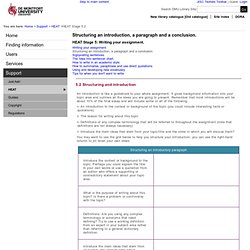

Writing Introductions. Structuring an introduction, a paragraph and a conclusion. 5.2 Structuring and introduction An introduction is like a guidebook to your whole assignment.

It gives background information into your topic area and outlines all the ideas you are going to present. Remember that most introductions will be about 10% of the final essay and will include some or all of the following: An introduction to the context or background of the topic (you could include interesting facts or quotations) The reason for writing about this topic Definitions of any complex terminology that will be referred to throughout the assignment (note that definitions are not always necessary) Introduce the main ideas that stem from your topic/title and the order in which you will discuss them? You may want to use the grid below to help you structure your introduction; you can use the right-hand column to jot down your own ideas. Structuring a paragraph in the main body of your assignment What is a paragraph? Is it developing a new idea? Anti-Anglizismen-WG: Man spricht deutsch.
Birgit Tanner Widmen sich der Sprachpflege: WG-Genossen Tim, Kiki, Fabian "Kompaktschallplattenspieler", "Lichtabtaster" oder "Herrenunterhose mit kurzem Beinteil": Diese deutschen Übersetzungen der englischen Begriffe "CD-Player", "Scanner" oder "Boxer-Shorts" gebraucht eigentlich niemand.

Und doch gehören sie zum täglichen Vokabular der drei WG-Genossen Tim, Fabian und Kiki. Die BWL- und Geografiestudenten leben zusammen in einer Wohngemeinschaft in Berlin-Mitte und haben sich der Pflege der deutschen Sprache verschrieben. Den Anstoß dazu gab ihnen Bundestagspräsident Wolfgang Thierse, der die Deutschen Anfang November in einer Fernsehsendung dazu aufrief, sich wieder stärker auf ihre Muttersprache zu besinnen. Moisturizer, Veggie-Wrap, King-Size-Menü - Einkaufs-Frust dank „Denglisch“-Wahn! - Ratgeber. Wer heute über 50 Jahre alt ist – also ein „Best Ager“ – könnte bei „Denglisch“-Begriffen in Drogerie, Supermarkt, Imbiss oft „Lost in Translation“ sein.

So Funny LOL. Language - Linguistic Change - Goethe-Institut. Service-Point and Mainstream – it is quite obvious that these German words come from English, or they seem to, anyway.

But many traces of English – so-called loan translations – are not as easy to recognise. English is penetrating languages around the world today, just as the medieval lingua franca made its mark on modern European languages. The German language integrates English expressions and phrases with particular ease, facilitated by the close relationship between the two Germanic languages. Pseudo-English Not only do the Germans take over English expressions, they also even invent new ones. The best-known example of such a pseudo-anglicism is the colloquial word for a mobile telephone, “Handy”. Enriching the German language In the past, the spelling of English words was usually germanised too, as in “Keks”, which was derived from cakes back in the early twentieth century. Today, the situation regarding information technology is similar. A living, developing language. Anglicisms.ho.ck - handout.angl.pdf.
PowerPoint-Präsentation - deutsche sprachgeschichte 10 neuhochdeutsch sommer 10.pdf. Why learn German? - Why study German? - 12 Reasons to learn German - Warum Deutsch lernen? 12 great reasons why you should start learning German today So you already have some perfectly good reasons for learning German ...

Maybe you want to be able to communicate with relatives, or to travel to Germany during your summer break, or prepare yourself for study in a German-speaking country. Maybe a German exchange student sparked your interest, or you have a friend who recommended it, or you just like the way the language sounds. Just in case you need some reassurance in your decision or the final push toward taking the plunge, here are 12 more solid reasons why learning German may be a good choice for you.
If you first need to be convinced that you should learn a language, then read why everyone should learn a language. 'Youth Word of the Year' shows 'problem' of trendy English. Photo: DPA Published: 06 Dec 2011 10:00 GMT+01:00Updated: 06 Dec 2011 10:00 GMT+01:00 An organisation promoting the proper use of German has slammed dictionary-maker Langenscheidt’s choice for the country’s “Youth Word of the Year” – because it is derived from English.

The trendiest German word used by young people this year is “Swag”, defined as “enviable, casual-cool charisma” or a “charismatic, positive aura,” according to a jury of young people and journalists appointed by Langenscheidt. It is the first time in four years of choosing the “Youth Word of the Year,” that the winner can be traced back to an English word – in this case the word swagger. But Holger Klatte, a spokesman at the Verein Deutsche Sprache told The Local that after conducting his own independent research he was “very sceptical” that German young people would use the word at all.
“The pick is a symptom of what’s happening in our society, that young people are seeing English as trendy,” he told The Local. Moises Mendoza. Germans fear language is being ruined by English. Mind your language: German linguists oppose influx of English words. In January Munich-based Siemens announced it would use fewer anglicisms in future.

Photograph: Sascha Schuermann/AFP/Getty Images It is the mother tongue of Goethe, Schiller and Brecht, a language still spoken by more than 100 million people worldwide. But an increasing number of linguists now fear German is under mortal danger from a torrent of anglicisms flooding into the nation's vocabulary. The German Language Association (Verein Deutsche Sprache, or VDS) fears that German could become a "peripheral" language if steps are not taken to protect it from foreign invasions. Each month the VDS updates its Anglicism Index, which reports new English words which have crept into common parlance and then suggests home grown alternatives.
"German has been losing its importance for 100 years," said Holger Klatte, spokesman of the VDS.